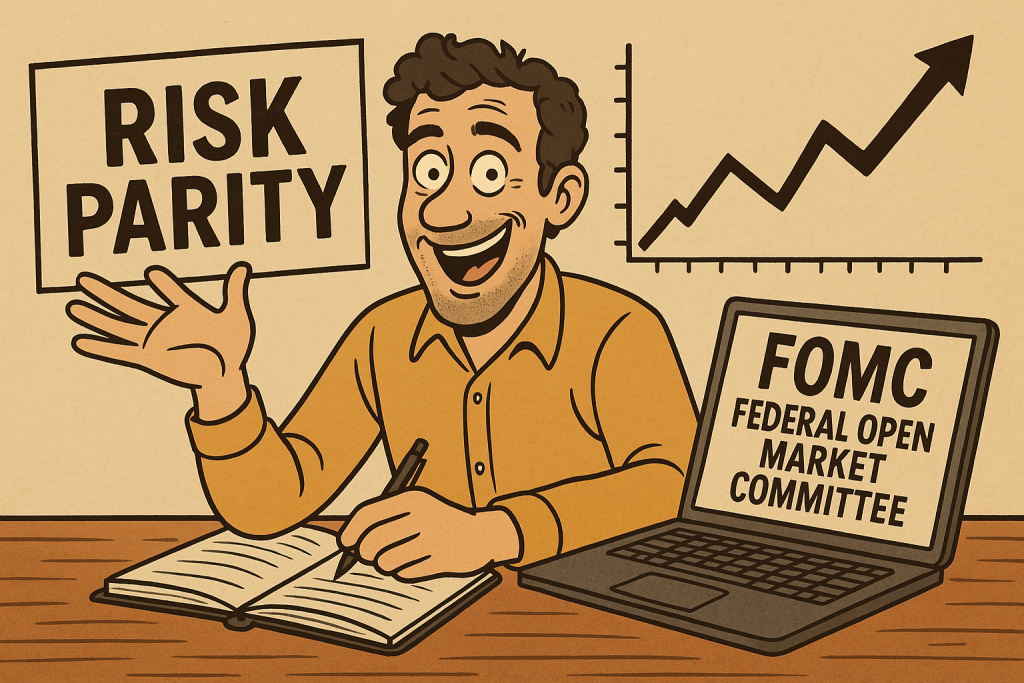Why Risk Parity Traders Secretly Love the FOMC (Even If They Won’t Admit It)

You know that moment when you hit “buy” on a risky trade, then immediately refresh your economic calendar like it’s the last episode of a suspense thriller? Yeah—chances are, the FOMC (Federal Open Market Committee) is the villain or hero of that plot twist.
But here’s the kicker most retail traders miss: if you’ve been sleeping on the risk parity strategy in the Forex market, you might as well be wearing flip-flops to a black-tie event.
Let’s break it down—without the boring textbook vibes—and show you why the FOMC is secretly your best wingman in risk parity trading. And yes, we’ll sprinkle in a few ninja tricks, trader confessionals, and expert-level secrets that’ll make your broker sweat.
The FOMC: Not Just a Fancy Acronym With Economic Drama
Every Forex trader has heard the term FOMC (Federal Open Market Committee), usually in the same tone one might use when whispering about an ex. You know it’s important. You know it affects your life. But you’re not quite sure how.
Here’s the cheat sheet:
They meet eight times a year (minimum), making interest rate decisions.
Their statements shake markets harder than an energy drink on an empty stomach.
Their dot plots? Think: economic tea leaves for pros.
???? Pro Tip: The FOMC’s decisions affect interest rate differentials, which in turn directly impact currency strength. This isn’t just academic—it’s how most Forex trends start.
As Ray Dalio once said, “He who lives by the rate dies by the rate.” (Okay, maybe he didn’t say it exactly like that, but let’s roll with it.)
Risk Parity: The Strategy That Doesn’t Panic When the Fed Sneezes
Risk parity is like that one trader in the room who doesn’t flinch when the market dips 100 pips in 10 minutes. It’s calm. It’s balanced. And it’s quietly outperforming the drama queens.
At its core, risk parity allocates capital based on volatility, not raw asset value. The idea? Every asset should contribute equal risk to the portfolio.
When used in Forex, it looks something like this:
Pairs with high volatility (like GBP/JPY) get smaller position sizes.
Low volatility pairs (like EUR/CHF) get beefier allocations.
The goal? Smoothed-out returns, less heartbreak, and fewer emotional breakdowns at 2 AM.
???? Hidden Advantage: During FOMC weeks, risk parity portfolios adjust automatically—reducing exposure to the craziest pairs and leaning into the chill ones. That’s like having an emotional support dog for your trades.
Why Most Traders Get It Wrong (And How You Can Avoid It)
Let’s address the awkward truth: most retail traders treat FOMC week like a roulette table.
They YOLO into trades based on headlines.
They ignore volatility spikes.
They don’t adjust position sizing.
And they confuse “market reaction” with “market direction.”
???? Oops.
But here’s where the real magic happens…
The Ninja Blueprint: FOMC-Driven Risk Parity Strategy (In 5 Tactical Steps)
Let’s take your risk parity game from “I read about it once” to “I’m quietly crushing hedge funds.”
1. Pre-FOMC Volatility Scan
Use ATR (Average True Range) to rank major currency pairs.
Identify which pairs are heating up pre-announcement.
2. Dynamic Position Sizing
Allocate capital so each trade contributes equal risk.
Tools like the StarseedFX Smart Trading Tool can automate this with ridiculous accuracy.
3. Hedge the Hype
Consider inverse exposure (e.g., long USD/JPY, short EUR/USD) based on historical FOMC shockwaves.
4. Wait for the Whiplash
Don’t trade the news—trade the reaction 15–30 minutes later.
The initial spike is often a head fake.
5. Rebalance Like a Pro
After the FOMC fireworks, re-run your risk parity model.
Volatility shifts fast—don’t let yesterday’s settings ruin tomorrow’s trades.
Data They Don’t Show on CNBC
Let’s get nerdy (in a good way). According to a study by Bridgewater Associates, risk parity strategies delivered higher Sharpe ratios during periods of policy uncertainty—including FOMC shakeups.
???? Stat Attack:
Risk parity funds averaged a 10.3% return in the 12 months following major FOMC tightening cycles (source: Bloomberg, 2023).
Volatility-weighted allocations reduced drawdowns by up to 40% compared to static models during Fed pivots (source: Bank of International Settlements).
So if you’re still betting the farm on a directional USD/CAD play without adjusting for volatility, you’re essentially using a Nokia flip phone in an iPhone world.
What the Pros Are Whispering
Dr. Carolyn Wilkins, former Senior Deputy Governor at the Bank of Canada:
“Markets tend to overreact to FOMC policy changes. Sophisticated models, like risk parity, help neutralize that behavioral bias.”
Ashraf Laidi, Chief Market Strategist at Intermarket Strategy:
“Risk parity isn’t about prediction—it’s about preparation. It’s the antidote to emotional trading, especially when the Fed is in the spotlight.”
The Hidden Patterns That Drive the Market
Here’s a little secret from deep in the hedge fund playbook:
???? FOMC announcements generate predictable volatility clusters.
48 hours before: increased volume and widening spreads
1 hour after: rapid mean reversion
2 days later: trend confirmation or full reversal
This pattern repeats like your favorite Netflix rom-com—and smart traders position themselves accordingly.
The Forgotten Strategy That Outsmarted the Pros
Remember March 2023? The Fed dropped a not-so-subtle rate hike. Retail traders panicked. Twitter exploded. But risk parity portfolios?
???? Quietly outperformed.
By reducing USD exposure before the hike and increasing allocation to JPY pairs post-announcement (based on volatility decline), they captured gains while everyone else was licking their wounds.
Let’s Recap: What You’ve Just Unlocked
Here’s your bulletproof edge, wrapped in ninja cloth:
FOMC is your friend (if you treat it like a calculated risk, not a thrill ride).
Risk parity is your seatbelt—it reduces volatility, improves longevity.
Pre-FOMC adjustments win more than post-announcement panic.
Data matters—especially when paired with volatility insights.
You’re now trading like a quant, not a gambler.
Still Trading Blind During FOMC Weeks? We Got You.
????️????️ Don’t go it alone. Join the pros in the StarseedFX Community for expert analysis, pre-FOMC breakdowns, and live trade alerts.
???? Want to master risk parity from the inside out? Dive into the Free Forex Courses.
???? Keep track of your evolving strategy with the Free Trading Journal—because your memory isn’t as sharp as your trades.
Ready to Trade Like the Institutions (But Funnier)?
We’ve just uncovered how to use risk parity to dominate the FOMC Federal Open Market Committee chaos. You’ve got the data, the tools, and now the upper hand.
Go forth, fellow trading ninja—and may your risk always be proportionate, your trades always intentional, and your jokes only slightly better than your broker’s.
—————–
Image Credits: Cover image at the top is AI-generated
PLEASE NOTE: This is not trading advice. It is educational content. Markets are influenced by numerous factors, and their reactions can vary each time.

Anne Durrell & Mo
About the Author
Anne Durrell (aka Anne Abouzeid), a former teacher, has a unique talent for transforming complex Forex concepts into something easy, accessible, and even fun. With a blend of humor and in-depth market insight, Anne makes learning about Forex both enlightening and entertaining. She began her trading journey alongside her husband, Mohamed Abouzeid, and they have now been trading full-time for over 12 years.
Anne loves writing and sharing her expertise. For those new to trading, she provides a variety of free forex courses on StarseedFX. If you enjoy the content and want to support her work, consider joining The StarseedFX Community, where you will get daily market insights and trading alerts.
Share This Articles
Recent Articles
The GBP/NZD Magic Trick: How Genetic Algorithms Can Transform Your Forex Strategy
The British Pound-New Zealand Dollar: Genetic Algorithms and the Hidden Forces Shaping Currency Pairs
Chande Momentum Oscillator Hack for AUD/JPY
The Forgotten Momentum Trick That’s Quietly Dominating AUD/JPY Why Most Traders Miss the Signal
Bearish Market Hack HFT Firms Hope You’ll Never Learn
The One Bearish Market Hack High Frequency Traders Don't Want You to Know The

